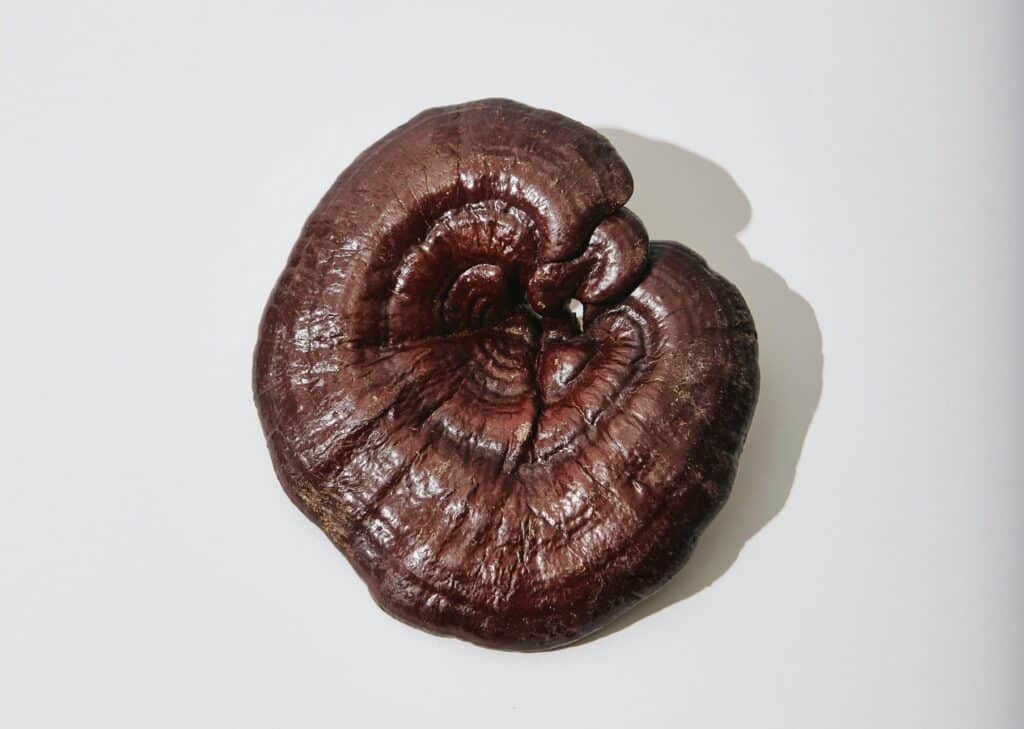You’ve likely heard of the medicinal benefits of psilocybin mushrooms, such as their ability to help treat depression, anxiety, and even cluster headaches and migraines. But which mushrooms are best for each respective condition?
This article will discuss the medicinal properties of psychedelic mushrooms and adaptogenic mushrooms so you can make a well-informed decision on which treatments may be best suited for you.
Adaptogenic mushrooms
Adaptogenic mushrooms are a relatively new form of supplementation. Although the science behind them is still emerging, they are known to be effective for certain health conditions. These whole mushrooms can be incorporated into your daily meals or taken as supplements in capsules and in powder or tincture form.
As the name suggests, adaptogenic mushrooms adapt to the current needs of your body by producing a balancing effect on our hypothalamic-pituitary-endocrine axis. It’s here where the brain meets our hormone system. Adaptogenic mushrooms help support our body’s natural response to stressors such as physical recovery from exercise or illness, and even mental and emotional recovery from work or caretaking after our family and selves.
Lion’s Mane
Studies have shown that lion’s mane mushrooms can be used to reduce the symptoms of several conditions, namely memory impairments such as dementia, depression, anxiety, and nerve-related damage.
Lion’s mane or Hericium erinaceus contains bioactive substances known to support cognitive functions. The compounds in lion’s mane stimulate brain chemicals such as dopamine and serotonin. Depression is caused by a deficiency or imbalance of these neurotransmitters within the brain.
Multiple studies have shown that lion’s mane mushrooms may improve mood and reduce anxiety symptoms. More specifically, a 2010 study conducted by Pit Shan Chong and colleagues followed 30 participants who showed a significant improvement of depressive symptoms after just four weeks of treatment with lion’s mane. The levels of excitatory neurotransmitters were reversed by lion’s mane, which raised serotonin levels in participants.
Lion’s mane has also been shown to be effective in reducing symptoms of depression and anxiety in mice and increasing brain nerve cell production. Although lion’s mane has only recently begun to be studied clinically, its use in traditional Chinese medicine and ample anecdotal evidence suggests high efficacy.
Lion’s mane’s potent anti-inflammatory and antioxidant properties also make them a great candidate for treatment of memory impairments. Inflammation in the brain has been extensively linked to the development of memory loss disorders such as Alzeihmers disease.
The effects from lion’s mane may not be felt immediately. It may take up to 2 weeks for you to begin to experience the full benefits. Stomach upsets can sometimes be caused by taking mushrooms regularly.
Therefore, as with any herbal supplement, you should talk to a healthcare provider if you have any concerns about fungi or have an adverse reaction to them. To avoid side effects, you should only consume 1000mg of this mushroom per day.
The research on the use of lion’s mane mushrooms to treat depression is still in its infancy. Although it is not an all-cure, lion’s mane mushroom is considered safe to consume.
More recently, lion’s mane has gained popularity through its inclusion in a microdosing protocol called the “Paul Stamets stack”. The regimen involves consuming a microdose of psilocybin mushrooms (about .1 grams) with 5-20 grams of dried or powdered lion’s mane and 75-200 mg of niacin (vitamin B3).
On their own, these two mushrooms promote neurogenesis (the formation of new neurons in the brain), which stimulate stronger neural communication.
Niacin pushes the active compounds in psilocybin and lion’s mane mushrooms to the extremities/ dendritic spines of our neurons, encouraging further limbic extension of our cells. This increases the points of contact between our neurons.
For more information on this microdosing protocol, we empower you to download our free microdosing guide located at the top of our webpage!
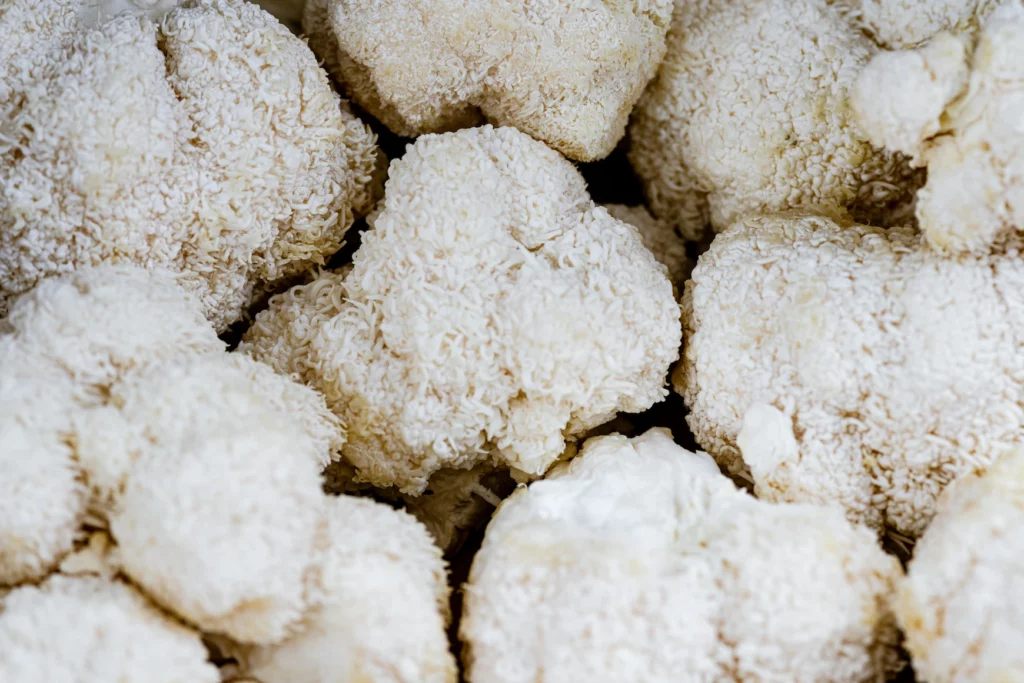
Shiitake mushrooms
Emerging from Japanese research and tradition is the use of Lentinus edodes or shiitake mushrooms for treatment of gastric cancer, cell damage, and increasing white blood cell production.
They contain bioactive chemicals that stimulate the immune system and boost the body’s ability to fight infections. They also have anti-inflammatory and antioxidant properties.
This mushroom has been used for centuries to boost cardiac health and improve overall physical health. Shiitake mushrooms are also a great source of vitamin D, zinc and other nutrients like selenium and copper. Shiitake mushrooms have a low-calorie intake and are rich in fiber and many other nutrients.
Being a great source of B vitamins, shiitake mushrooms support our body’s adrenal gland functions by helping to convert the nutrients of our food into energy. Most pressingly, the high presence of lentinan-containing polysaccharides and other beta-glucans make this an ideal supplement for boosting production of white blood cells.
An animal study conducted by Shanggong Yu et al., in 2016 demonstrated that shiitake mushrooms can significantly reduce the risk of strokes and heart attacks, while also reducing blood pressure and cholesterol levels through a compound called eritadenine.
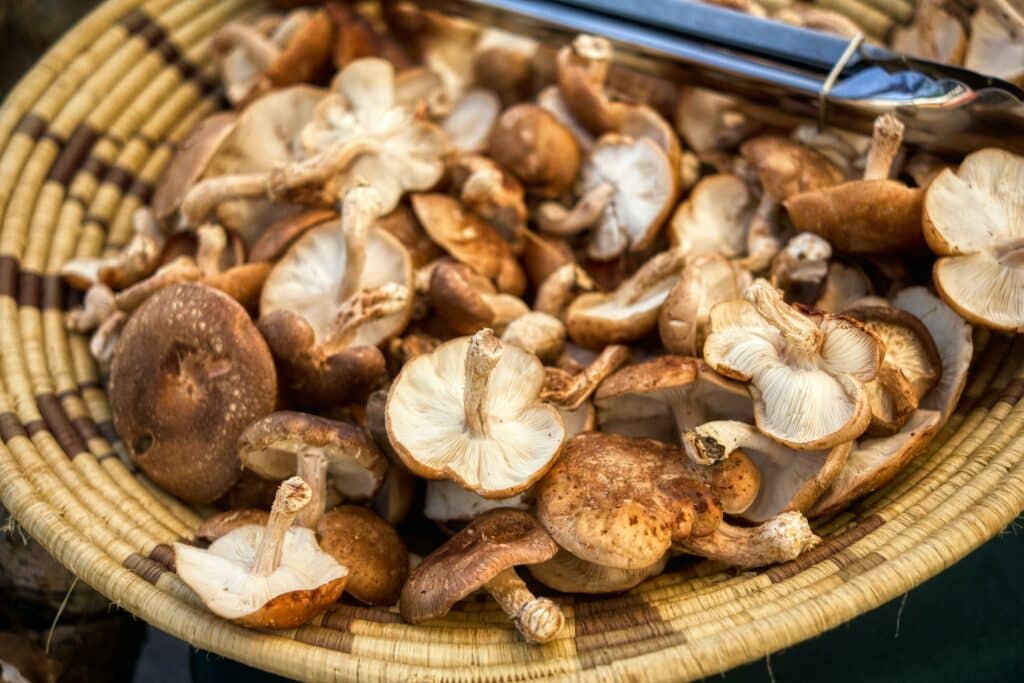
Cordyceps
Cordyceps mushrooms are known for their natural energy boosting properties. Taking cordyceps in the morning and reishi mushrooms in the evening has been shown to reset and regulate our body’s circadian rhythm. This allows for more energizing days and better nights of sleep.
A double-blind, placebo-controlled study conducted by Steve Chen and colleagues in 2010 found that a 12-week cordyceps treatment regimen improved athletic performance, as the metabolic threshold increased by 10.5%.
Its anti-inflammatory and antioxidant effects were studied in 2016 by Ningqun Wang et al. The study found that cordyceps relaxes the airways and improves the quality of life of people with moderate to severe asthma.
Their antioxidant properties also provide high anti-aging potential. Antioxidants neutralize free radicals in our body which contribute to the aging process. In a 2011 study conducted by Ning-Zhi Tan and colleagues, they found that compared to a control group, mice who’d been fed cordyceps from the age of 1 year, experienced an extended lifespan of 10-66 days.
Cordyceps also demonstrates the remarkable ability to induce apoptosis, or cell death in cancer cells. Studies have found this to be true for breast cancer cells and colon cancer cells.
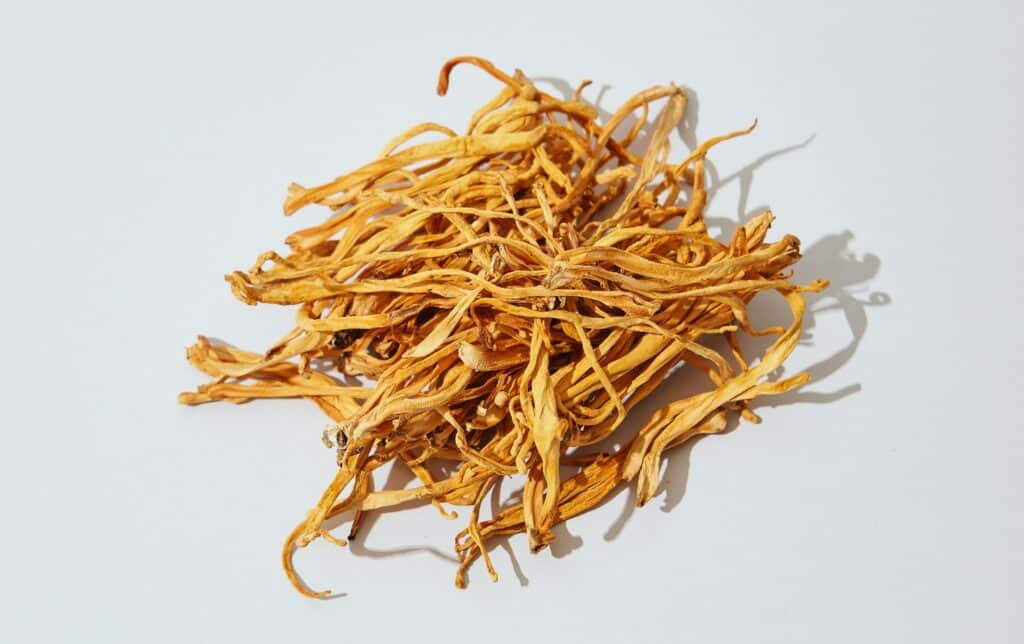
Reishi
Reishi mushrooms are known for their immune boosting, anti-cancer, anti-anxiety, and sleep-promoting properties. Native to the humid temperatures of Asia, these mighty fungi contain triterpenoids, polysaccharides and peptidoglycans. These molecules can help modify inflammation in the pathways of our cells.
A study conducted by Yihuai Gao and colleagues in 2003 found that a 12-week treatment with 1800 mg of reishi yielded a significant increase in natural killer cell activity in patients with advanced-stage cancer. This enhancement of immune function has been noted in other cancer studies who’ve observed significant increases in lymphocytes (a type of white blood cell).
To study Reishi’s potential for treatment of anxiety and depression, Hong Zhao et al., conducted a 2011 study on 48 breast cancer patients. After 4 weeks of treatment, the patients reported overall better quality of life with far less symptoms of anxiety and depression.
In 2011, Xiang-Yu Cui and colleagues led a study on the effects of reishi on sleep time in rats. Using EEG monitoring, they found that after 3 days of oral supplementation with reishi, total sleep time significantly increased in test rats without any disruption of REM sleep. Studies like this suggest that reishi may be a good option for those suffering from impaired sleep.
Psychedelic Mushrooms (Psilocybin-Containing)
Much evidence has come to demonstrate that psychedelic mushrooms are an effective treatment for a multitude of mental/ emotional and physical ailments. These ailments include, but are not limited to treatment-resistant depression, anxiety, PTSD, eating disorders, and substance use disorder. In fact, we’ve written an entire article dedicated to understanding the types of diseases that psychedelics can effectively treat.
Research into psychedelic mushrooms shows that psilocybin, the main psychoactive component in ‘magic’ mushrooms, produces sustainable antidepressant and anti-anxiety effects on both a microdose and macrodose. Psilocybin has proven to be a game-changer for people suffering from a very large spectrum of mental and somatic disorders.
Research at the Imperial Centre for Mental Health found that psilocybin improves brain connectivity, by enhancing mental clarity, focus, and emotional-processing abilities, which in turn helps depression and anxiety patients feel more stable. Researchers also discovered that psychedelics can be used to alleviate certain thought patterns that lead to depression by catalyzing rapid and deep seated changes in perspective.
Although changes in brain mediators can be difficult to notice on a microdose, they build up over time and become more obvious as layers of our conditioning begin to organically disembed from our subconscious minds. This allows us to take on more whole and dynamic outlooks on our place, purpose, and relation to the world.
Unlike adaptogenic mushrooms, psilocybin-containing mushrooms produce hallucinogenic effects. When taken under the right conditions, these mushrooms allow us to address any pressing aspect of our lives with much more openness and vulnerability. This journey of the mind and soul expands our awareness by welcoming new, less rigid forms of thought and reflection into our lives.
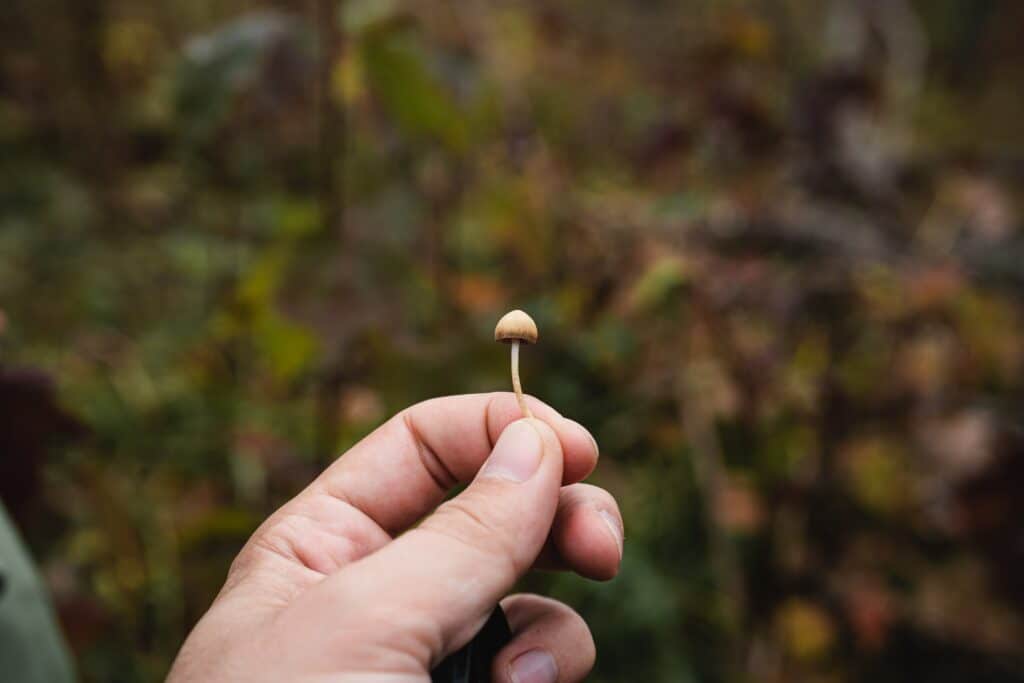
Closing Off
To reap the most benefits from psychedelic mushrooms, proper preparation and integration measures should always be taken. Here, at Psychedelic Passage, our network of experienced facilitators could help you navigate the intentional inner work that accompanies a therapeutic psychedelic experience.
If you’re interested in learning more, we encourage you to book a consultation with us. Whether or not you have a ceremony with us, we’re here to be a resource to you. Therefore, we invite you to take a peek at our blog page where you’ll find an extensive library of informative articles on everything-psychedelic. Safe journeying, friends!
